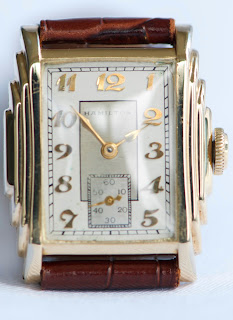HAMILTON WATCH COMPANY
The Hamilton Watch Co. was founded in 1892 in Lancaster, Pennsylvania. A watch manufacturer with it's origins making pocket watches known as the "watch of railway accuracy". Strap watches, or wristwatches, were introduced by Hamilton sometime around the first world war and many of them were worn by U.S. and allied troops. This would be repeated during the second world war where production for a number of years were dedicated to producing watches for service personnel.
Hamilton did everything in their plant in Pensilvania. From manufacturing the tiny screws to the oils that lubricated the intricate wheels. If went into a Hamilton watch, they made it. Manufacturing in the U.S continued for Hamilton up until to the late 1960s when Hamilton moved their production to Switzerland, following the trend in watchmaking at the time.
Vintage pocket and wristwatches were "mechanical" in that a spring was the power source that needed to be wound from time to time. Hamilton incidently introduced the first electric watch in the 1950s, an electric hybrid, using the principles of a mechancial watch powered by a battery instead of a spring. Modern watches are typically electronic, using a quartz crystal that is electrically charged by a battery.
 |
| My 1936 Hamilton Watch Company share certificate |
 |
| A vintage postcard showing the Hamilton watch manufacturing plant |
THE HAMILTON PUTNAM WRISTWATCH
The Putnam shows up in the 1932 Hamilton and Illinois catalog price list and was produced through 1935. We get a peak of the Putnam in the subsequent 1933 Hamilton catalog.
 |
| 1932 Hamilton Illinois Price List Excerpt |
 |
| 1933 Hamilton Catalog Excerpt |
The 1933 catalog showed that it came in both yellow and white 14k gold fill and a choice of a couple of dials - raised gold numerals or a luminous dial. My version below is yellow gold filled with raised gold numerals. During this watch obsession of mine I've noticed many collectors collect a certain model and all it's variations. When you think about it, watches came in white, yellow and green gold fill along with solid gold then you add three, four or more dial options, the permutations are overwhelming.
 |
| My 1933 Hamilton Putnam |
My particular 1933 version has a refinished dial (the face of the watch). Some purists might keep the original dial but this is how mine came to me and the original dial likely detracted from the overall watch and was redone.
There are a number of ways to confirm a watches date, some of which I've mentioned.
- Catalog references
- Advertisements
- Movement serial number database (Movement Database)
- An obvious engraving on the back
- Original sales receipt
- Inner and outer boxes - both the presentation box and the box that that box was in.
Varying production dates at the manufacturer sometimes meant the case and movement are of different years. Some watch cases have a roman numeral engraved in them that can often match the movement serial number letting you know that the case and movement left the manufacturer at the same time. Catalogs mention the movement associated with the model so you can at least know they match. One caveat, watchmakers like Hamilton often "tweaked" their movements from year to year and simply added a letter after the movement number so you need to be aware when buying vintage watches. Confused yet? If you're a purist, it matters.
Other times, as a mechanical watch was often a lifelong timepiece, when it got serviced at the local watchmaker every 3 to 5 years the movement may have needed to be replaced just like the strap.
 |
| A watchmaker plying his craft |
To me the Putnam represents the quintessential "art deco" styling with its stepped case. I have a number of Hamilton watches from the 1930s and they represent to me the pride of my collection.


.jpg)

Putnam Wristwatch are cute in design. Yeah that is true they have a variety of designs compared to apple and cheaper in price than the apple watch.
ReplyDelete